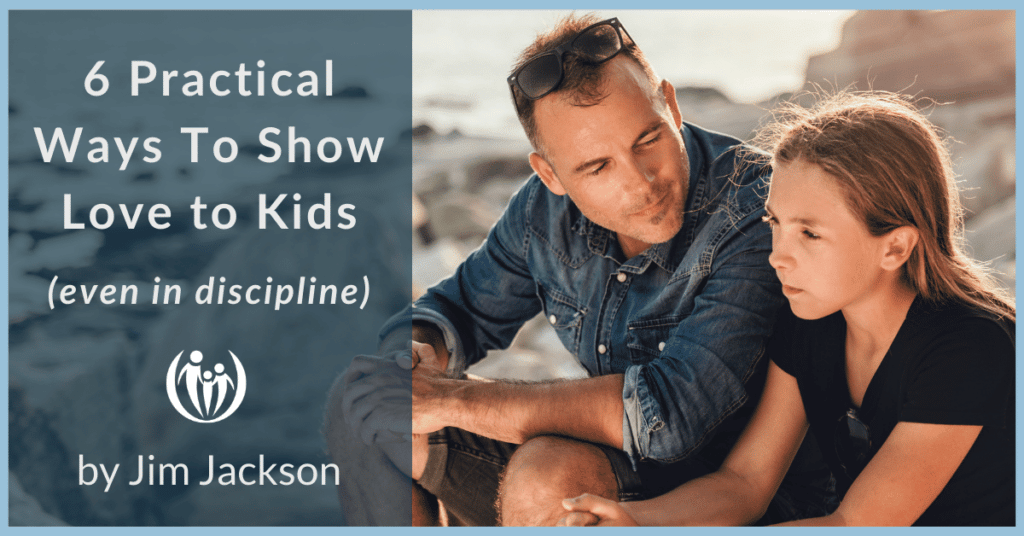
6 Practical Ways To Show Love to Kids

One of the best times to show love to your kids is when they are misbehaving. Anger, frustration, and lecturing are standard reactions to a kid who does something wrong, but do they work to change behavior? I worked with many troubled kids before I co-founded Connected Families with Lynne and learned quite a few things about the messages kids receive (and don’t receive) when they are getting a consequence. Many kids who did something wrong, already defined themselves as “bad.” Undeserving of love. Yet, this is not how God responds to our sin, even when we are at our worst. (See Romans 3:23-24.)
After years of working with kids and families, I think the most important thing to show kids all the time is that they are safe with me and are loved. As a matter of fact, when kids misbehave, I get a gleam in my eye. I get a chance to show them how valuable they are. As parents, we want to show our children the kind of love that God shows us. Maybe you don’t know where to start. Here are six simple ideas, based on our own personal and professional experiences that can ensure that your children feel safe and loved, even in difficult discipline situations.
1. Get down on kids’ level
Standing posture is frequently employed as a high-pressure sales tactic because it puts the seller in an intimidating position that is much more likely to coerce a decision to buy. Parents can often loom over small children, and even tall teens may still think of parents as bigger and more powerful. One important way we can communicate being “for” our children is to “shrink” our posture by sitting or kneeling and keeping open body language (e.g. uncrossed arms). Also, look at them. Eyes have been appropriately called the windows to the soul. Let them see that you desire what’s best for them by the way you look at them.
2. Stop, breathe and pray
Sometimes, our immediate response to misbehavior is anger. It is important to not let your anger rule the show. Instead, calm yourself down before you engage. Learning to stop, breathe and get perspective through prayer for wisdom helps you avoid thoughtless, hurtful words. If possible, you might need to step out of the room or decide with your child to separate for a determined period of time and meet again when you are less angry. Get away from the situation and invite the Holy Spirit in. Maybe walk around the block and spend some time thinking about what qualities you especially love in your child. Think about the future. How do you want your child to learn from this experience that will better equip them for life? Read this post on breathing in God’s presence when you feel like you are going to lose your cool.
3. Give appropriate, gentle touch
Safe, affectionate touch is a powerful communicator of love. The human need for loving touch is as crucial to healthy development as the need to hear words of love. A hug or a gentle hand on the shoulder can be calming, reassuring, and connective — if the child doesn’t perceive some other agenda. If we put a hand on our son’s shoulder during an argument with any hint of control he reacted angrily, but our kids usually appreciated the offer of a hug when they were ready.
4. Listen and empathize
Whether behaving or misbehaving, children desperately want their parents to engage with them–to give them energized, focused attention. Listening to your child allows them to feel that you care about their needs. When you can articulate and identify with your children’s feelings, it helps them to know that you are on their side. At times, as parents, we jump to conclusions about what is driving our child’s misbehavior. Have you considered simply asking her what’s going on? With calm and curious questions, you allow your child safety to talk through their actions–while you listen.
5. Let them know you’ve heard them
When children feel they are being heard, they feel respected, which makes them far less inclined to continue defiant behavior. Show your understanding by restating your child’s words with “what I hear you saying is” and then give them a chance to help you understand their perspective better. Sometimes, just the time it takes to reflect together can defuse a tense situation.
6. Verbalize “I love you,”
This may seem obvious, but it’s important. Telling our kids we love them requires a sincere heart, free of manipulation. The goal is to transform hearts, both yours and your child’s, not mere compliance. Unconditional love is not just praise for positive behavior. It is devotion and affection for someone, regardless of his behavior, appearance, performance, or ability to meet my needs. If you can make a habit of expressing your love to your children in all different kinds of times, positive behavior or not, we believe you will begin to see different outcomes with your children, and they will begin to internalize the message of “love no matter what.”
When discipline aims at quick fixes to the behavior, it tends to be short-sighted, random, punitive, and unpredictable. Are you longing to find a different way to parent? One that is both biblical and research-based? Our Discipline That Connects With Your Child’s Heart online course is only offered twice a year. Registration is open! Join us. Your kids will thank you.




